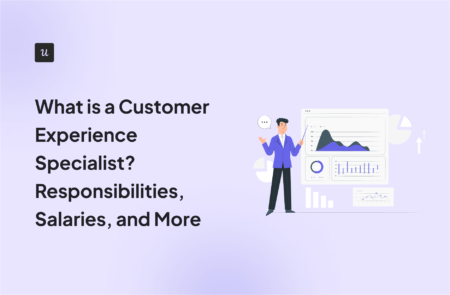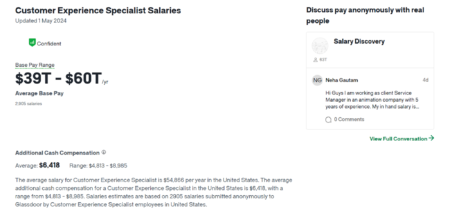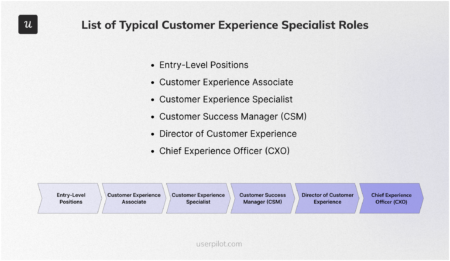
What is a Customer Experience Specialist? Responsibilities, Salaries, and More
Whether you’re a seasoned professional or new to the field, understanding the nuances of customer experience specialists is essential for success.
In this guide, we’ll delve into the core responsibilities, salary insights, essential skills, and more, providing you with the knowledge and tools you need to excel as a customer experience specialist.
Try Userpilot Now
See Why 1,000+ Teams Choose Userpilot

What is a customer experience specialist (short summary)
- A customer experience (CX) specialist is a professional responsible for ensuring customers have positive interactions with a business/brand throughout their lifecycle.
- CX specialists typically interact with customers to understand their needs and pain points and resolve any problems they might be facing. They’re responsible for identifying key touchpoints where customers interact with a business–before, during, and after a purchase. Then, they use these insights to map the customer journey and identify opportunities to improve CX.
- According to Glassdoor, the average base pay of a customer experience specialist ranges between $39,000 to $60,000 annually.
- A CX specialist’s career starts with an entry-level role like a customer service representative or sales associate. It can go all the way up to Chief Experience Officer (CXO).Common customer experience roles include:
- Entry-level positions (0-2 years) – Roles like customer service representative, sales associate, or retail associate act as an entry point to a career in customer experience.
- Customer Experience Associate (2-3 years) – A CX associate communicates with customers to understand what they want and keep them happy.
- Customer Experience Specialist (4-5 years) – After gaining experience as a CX associate, it’s possible to move to the role of a CX specialist. This role focuses on analyzing customer behavior and feedback, addressing gaps in CX strategies, and improving interactions at different touchpoints.
- Customer Success Manager (CSM) (5-7 years) – If you gain adequate experience as a CX specialist and demonstrate leadership abilities, the next step is to become a customer success manager. As a CSM, one of your main responsibilities will be to understand customer needs and communicate them to other departments. You’ll also have to lead cross-functional teams when implementing strategies to enhance CX.
- Director of Customer Experience (8-10 years) – This senior-level position is for professionals with significant experience in customer success management. In this role, you’re responsible for overseeing multiple teams and strategies aimed at improving CX.
- Chief Experience Officer (CXO) (10+ years) – This is usually the highest-ranking CX role in an organization. Besides customer experience, a CXO is also responsible for ensuring a positive experience for employees.
- Looking into tools for customer experience specialists? Userpilot is an all-in-one product platform with engagement features and powerful analytics capabilities. Book a demo to see it in action!
What is a customer experience specialist?
A customer experience (CX) specialist is a professional responsible for ensuring customers have positive interactions with a business/brand throughout their lifecycle.
They play a crucial role in identifying and removing friction from the user journey and improving customer satisfaction and retention. Ultimately, a CX specialist drives customer loyalty and improves a company’s bottom line.
What does a customer experience specialist do?
CX specialists typically interact with customers to understand their needs and pain points and resolve any problems they might be facing. They’re responsible for identifying key touchpoints where customers interact with a business–before, during, and after a purchase. Then, they use these insights to map the customer journey and identify opportunities to improve CX.
Additionally, CX specialists collaborate with marketing, sales, product development, account management, and other teams to devise ways to eliminate friction from the customer journey. They’re also responsible for extracting actionable insights from customer feedback, user behavior data, and product metrics, like engagement rates and satisfaction levels.
Customer experience specialist’s main responsibilities
Whether a company is looking to retain customers or grow its user base, customer experience specialists play an integral role. Key responsibilities of a CX specialist include:
- Customer journey mapping – A CX specialist identifies customer interaction touchpoints and the challenges they face at every step. The idea is to remove friction from each touchpoint and ensure a seamless journey from start to finish.
- Customer engagement and support – A CX specialist is responsible for interacting with customers before, during, and after a conversion. They have to address customer queries and help them overcome any issues they face when using your product.
- CX strategy development – A CX specialist works with different departments, such as account management, product development, marketing, and sales, to identify strategies to enhance the customer experience. Also, they’re responsible for keeping an eye on emerging industry trends and changes in customer behavior and needs. Then, they use these insights to adapt CX strategies accordingly.
- Data analysis and reporting – A CX specialist analyzes qualitative and quantitative data from various sources to identify areas of improvement. These include feedback surveys, focus groups, and one-on-one interviews. Also, they use product analytics tools to analyze user behavior patterns and product metrics. They retrieve actionable insights from the available data and create meaningful reports to help other departments make data-driven CX-related decisions.
- Training and development – A CX specialist is responsible for educating their team members, as well as employees in other departments, about user needs and preferences. They train employees in various departments to embrace a customer-centric approach.
- Technology and innovation – A CX specialist identifies and uses tech-driven solutions to streamline functions like customer support and feedback collection. They also have to identify and implement processes to deliver outstanding CX without compromising efficiency.
Customer experience specialist salary
According to Glassdoor, the average base pay of a customer experience specialist ranges between $39,000 to $60,000 annually.
Your experience level is a key factor that impacts your salary. Here’s how a CX specialist’s annual salary varies based on experience, according to Glassdoor:
- CX representative – $35,000 to $50,000/year
- CX specialist – $39,000 to $60,000/year
- Senior CX specialist – $44,000 to $74,000/year
Additionally, where you live influences your pay as a CX specialist. Here’s how your annual salary can vary across major US cities:
- San Francisco – $49,000 to $75,000/year
- New York – $44,000 to $70,000/year
- Boston – $44,000 to $63,000/year
- Washington, DC – $43,000 to $70,000/year
- Chicago – $42,000 to $61,000/year

Customer experience specialist career path
A CX specialist’s career starts with an entry-level role like a customer service representative or sales associate. It can go all the way up to Chief Experience Officer (CXO).
Common customer experience roles include:
- Entry-level positions (0-2 years) – Roles like customer service representative, sales associate, or retail associate act as an entry point to a career in customer experience.
- Customer Experience Associate (2-3 years) – A CX associate communicates with customers to understand what they want and keep them happy.
- Customer Experience Specialist (4-5 years) – After gaining experience as a CX associate, it’s possible to move to the role of a CX specialist. This role focuses on analyzing customer behavior and feedback, addressing gaps in CX strategies, and improving interactions at different touchpoints.
- Customer Success Manager (CSM) (5-7 years) – If you gain adequate experience as a CX specialist and demonstrate leadership abilities, the next step is to become a customer success manager. As a CSM, one of your main responsibilities will be to understand customer needs and communicate them to other departments. You’ll also have to lead cross-functional teams when implementing strategies to enhance CX.
- Director of Customer Experience (8-10 years) – This senior-level position is for professionals with significant experience in customer success management. In this role, you’re responsible for overseeing multiple teams and strategies aimed at improving CX.
- Chief Experience Officer (CXO) (10+ years) – This is usually the highest-ranking CX role in an organization. Besides customer experience, a CXO is also responsible for ensuring a positive experience for employees.

Best practices for being a great customer experience specialist
Making a mark as a CX specialist isn’t all about getting the right degree or certifications. Instead, you must be willing to go out of your way to ensure your product lives up to customer expectations and makes them happy.
If you want to build a career as a customer experience specialist, consider the following tips:
- Build your soft skills – Traits like empathy, active listening, and problem-solving are critical to becoming a good CX specialist. While you’re getting the necessary experience and qualifications, make sure you focus on building these skills.
- Be a team player – A CX specialist’s job requires them to work in cross-functional teams involving multiple stakeholders. Being able to communicate your ideas, understand others’ perspectives, and lead team members (when needed) is crucial.
- Prioritize product knowledge – You must have a deep understanding of how the given product works and how it addresses customer pain points. It’ll help you provide customers with the right guidance when they face problems.
- Develop an eye for problem-spotting – Beyond addressing customer queries and solving their issues, a CX specialist must have the ability to predict problems that might arise in the long run.
- Embrace continuous learning – As a CX specialist, you must stay curious about industry trends, consumer behavior patterns, and tech innovations. Also, don’t hesitate to modify your approach as customer preferences change or new technologies emerge.
Customer experience specialist FAQs
Is customer experience specialist a good career?
The demand for customer experience specialists is growing across different industries, from retail and hospitality to SaaS. It’s a particularly good career option if you have a knack for problem-solving and interacting with different people.
What makes a good customer specialist?
Essential skills for a good customer experience specialist include empathy, active listening, conflict resolution, and communication. A thorough understanding of feedback collection and data analytics is also crucial. Additionally, a CX specialist should have a finger on the latest market trends and changes in customer behavior.
What is a customer experience role?
A customer experience role, such as CX specialist or CX manager, is designed to help companies ensure positive interactions with customers. Professionals in CX roles are responsible for understanding customer needs and pain points and developing strategies to improve their experience.
What is customer experience in SaaS?
In the context of SaaS, customer experience covers every touchpoint a user goes through, from their first interaction to conversion to ongoing support. Frictionless CX is the key to driving user satisfaction, retention, and product adoption.
Conclusion
We hope this guide has provided you with valuable insights into the roles, responsibilities, and rewards associated with this role.
Looking into tools for customer experience specialists? Userpilot is an all-in-one product platform with engagement features and powerful analytics capabilities. Book a demo to see it in action!








